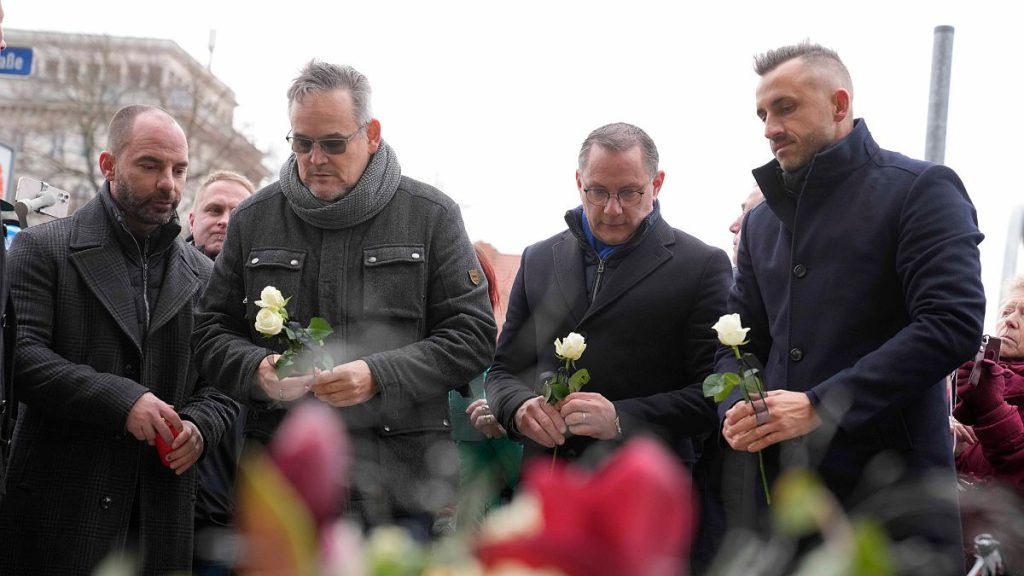The Christmas market attack in Magdeburg, Germany, has ignited a heated debate about security, immigration, and the exploitation of tragedy by political factions. The attack, which left several dead and hundreds injured, has been seized upon by the far-right Alternative for Germany (AfD) party as a platform to amplify their anti-immigration rhetoric and criticize the government’s security measures. AfD co-leader Tino Chrupalla has publicly demanded answers from Interior Minister Nancy Faeser, questioning the government’s effectiveness in preventing such attacks and expressing frustration with what he perceives as recurring violence against Germans. This incident occurs within a broader context of rising far-right sentiment in eastern Germany, where the AfD holds considerable sway, and in the lead-up to federal elections, raising concerns about the potential for the tragedy to be manipulated for political gain.
The attacker’s background adds a layer of complexity to the narrative. Identified as Taleb A., a 50-year-old psychiatrist and psychotherapy specialist residing in Germany for two decades, he reportedly attempted to connect with far-right organizations in both Germany and the UK, including the AfD and the English Defence League. His online presence reveals a focus on anti-Islam themes, criticism of the religion, and support for those leaving Islam, identifying himself as a former Muslim. He also criticized German authorities for their perceived inaction against “Islamism of Europe.” This complex profile muddies the waters, making it difficult to categorize the attack as solely Islamist or far-right motivated, and highlighting the intricate interplay of ideologies and motivations in such acts of violence.
Experts warn that the attack could become fuel for far-right narratives, particularly in eastern Germany, a region with strong AfD support. Professor Matthias Quent of Magdeburg-Stendal University of Applied Sciences notes the AfD’s significant electoral presence in the region and emphasizes the potential for disinformation and polarization surrounding the attack, especially in the context of upcoming elections. He highlights the vulnerability of the region to far-right mobilization and the risk of the tragedy being exploited to further their agenda. This potential exploitation raises concerns about the erosion of trust in institutions and the exacerbation of societal divisions.
The attack has also drawn international attention, with right-wing leaders across Europe weighing in. Hungarian Prime Minister Viktor Orbán directly linked the attack to immigration, claiming a connection between the “migration crisis” and terrorist acts in Western Europe. This connection, however, requires careful scrutiny in light of the attacker’s complex background. While Orbán’s statement aligns with a common right-wing narrative, the attacker’s purported association with far-right groups complicates the simplistic immigration-terrorism link. The case underscores the need for nuanced analysis that considers the interplay of various factors, rather than resorting to generalizations.
The attack in Magdeburg underscores the challenges faced by Germany and Europe in navigating the complexities of extremism, immigration, and security. The AfD’s attempt to capitalize on the tragedy for political gain raises concerns about the potential for further polarization and the exploitation of fear and anxiety. The attacker’s complex background, with apparent links to both anti-Islam and far-right ideologies, highlights the difficulty in neatly categorizing such acts and underscores the need for thorough investigation and nuanced understanding. The international response, particularly from right-wing figures like Viktor Orbán, also demonstrates the potential for such events to be instrumentalized in broader political agendas.
The Magdeburg incident serves as a stark reminder of the need for vigilance against all forms of extremism, whether from the far-right or Islamist groups. It underscores the importance of nuanced and fact-based analysis in understanding the motivations behind such acts and preventing their exploitation for political purposes. The attack’s potential to exacerbate social divisions and fuel further polarization highlights the urgent need for fostering social cohesion and resisting simplistic narratives that scapegoat specific groups. It also emphasizes the crucial role of responsible political leadership in preventing the exploitation of tragedy and promoting a climate of understanding and tolerance.














